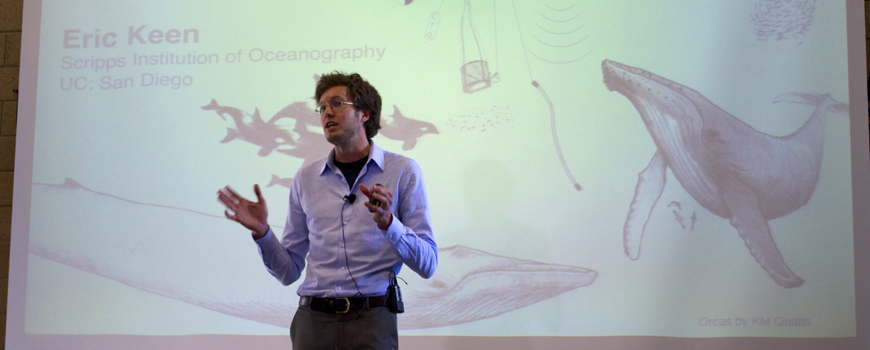Global S&T Development Trend Analysis Platform of Resources and Environment
| From the Porthole: Scripps Student Awarded for Innovative Research on Whale Behavior | |
| admin | |
| 2017-07-19 | |
| 发布年 | 2017 |
| 语种 | 英语 |
| 国家 | 美国 |
| 领域 | 资源环境 |
| 正文(英文) |  Scripps alumnus Eric Keen. Eric Keen, a recent graduate student at Scripps Institution of Oceanography at UC San Diego, was selected as the 22nd recipient of the Edward A. Frieman Prize for Excellence in Graduate Student Research. The Frieman Prize is awarded annually to a Scripps graduate student who has excelled in his or her research field, as measured by a recent publication. Keen’s paper, “Aggregative and feeding thresholds of sympatric rorqual whales within a fjord system,” was published in the March 2017 issue of the journal Ecosphere. The study examines how mobile predators such as rorqual whales (the largest group of baleen whales) deal with mobile prey, primarily krill and also copepods, fish, and cephalopods, in a marine ecosystem. Keen and a small team of researchers conducted visual and acoustic transect surveys and behavioral observations of fin and humpback whales in the northern fjords of British Columbia during the summers of 2014 and 2015. Using data collected at sea, Keen looked at two types of feeding thresholds in whales: foraging and aggregative. A foraging threshold occurs for some species when they choose not to engage in feeding behavior unless prey density is above a critical threshold. This is especially important for whales because feeding is so energetically costly. Aggregative thresholds are similar to foraging thresholds. Prey in an area must be sufficiently abundant before whales will aggregate in that area. If this threshold is not met, whales will move on to other potential foraging grounds. The publication demonstrates that you must consider both spatial ecology and behavioral interactions when examining threshold foraging behavior. “Without these perspectives, we cannot understand the mechanisms behind the distribution of endangered whale species and the strategies they use to obtain food, nor can we evaluate the potential risk of anthropogenic changes to the foraging habitat of threatened whales,” said Keen, who obtained his PhD in biological oceanography in June. Keen’s academic career was supported by funds from the National Science Foundation and the Scripps Oceanography education department, but he was responsible for raising the operational funds for his dissertation project. In order to study whales for two summers in Canada while on a limited budget, Keen purchased a small sailing vessel, R/V Bangarang, and selected the three-person research crew from among his network of friends and fellow graduate students. He was also responsible for making contact with local researchers and the Gitga’at Nation, one of the 14 tribes of the Tsimshian Nation in British Columbia, who helped facilitate the research. “Scripps gave me the freedom to devise and execute this kind of work, and I think the selection committee appreciated the independence and ambition of the effort,” said Keen. Scripps biological oceanographers and advisors Jay Barlow and Paul Dayton noted that Keen’s paper is one of only three studies of threshold foraging in whales. It’s also the first paper to study threshold foraging in the threatened fin whale, the first to compare threshold foraging behavior in two species concurrently, and the first to explore the relationship between two types of foraging thresholds within the context of local prey dynamics. “Beyond the importance of this work, the fieldwork that went into it stands out as an impressive and innovative approach to carrying out impactful studies in pelagic ecology,” said Barlow, adjunct professor at Scripps and researcher at NOAA’s Southwest Fisheries Science Center. “Eric’s project is unique in all my 40 years of experience at Scripps. He was captain, chief scientist, chief steward, supply officer, and chief boatswain of his research vessel.” Growing up in Florida, Keen was surrounded by the ocean and, as he describes, its “most exhilarating creatures,” from manatees and crocodiles to shorebirds, sharks, and whales. He later decided to specialize in whale ecology because understanding this field requires a comprehensive approach to scientific problems. “Whales are hitched to everything else in the ocean,” said Keen. “You can't understand whales without understanding their prey, and you can't explore those interactions without considering everything from physical oceanography to physiological energetics to the impact of humans on the ocean.” Keen said he was “thrilled and honored” to receive the Frieman Prize. He recently began a part-time postdoctoral fellowship at the University of Victoria and is also working with the North Coast Cetacean Society and the Foundation for Marine Ecology and Telemetry Research. “I take the award as encouragement and inspiration to continue producing Scripps-grade research as I enter my postdoctoral career,” said Keen. The Frieman Prize was established in 1996 to honor Edward A. Frieman, a plasma physicist and the eighth director of Scripps, on his 70th birthday. Learn more about the Edward A. Frieman Prize and see a complete list of previous recipients here. – Brittany Hook
|
| URL | 查看原文 |
| 来源平台 | Scripps Institution of Oceanography |
| 文献类型 | 新闻 |
| 条目标识符 | http://119.78.100.173/C666/handle/2XK7JSWQ/107560 |
| 专题 | 资源环境科学 |
| 推荐引用方式 GB/T 7714 | admin. From the Porthole: Scripps Student Awarded for Innovative Research on Whale Behavior. 2017. |
| 条目包含的文件 | 条目无相关文件。 | |||||
| 个性服务 |
| 推荐该条目 |
| 保存到收藏夹 |
| 查看访问统计 |
| 导出为Endnote文件 |
| 谷歌学术 |
| 谷歌学术中相似的文章 |
| [admin]的文章 |
| 百度学术 |
| 百度学术中相似的文章 |
| [admin]的文章 |
| 必应学术 |
| 必应学术中相似的文章 |
| [admin]的文章 |
| 相关权益政策 |
| 暂无数据 |
| 收藏/分享 |
除非特别说明,本系统中所有内容都受版权保护,并保留所有权利。
修改评论